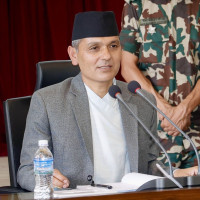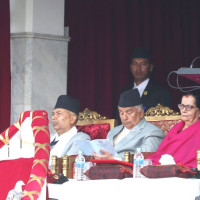- Friday, 20 February 2026
Declaration of Federal Republic: Momentous Day Of Nepal’s History
It is said that a momentous day rarely comes but comes once in a century. There are a few momentous days in the political history of Nepal. One of such momentous days in Nepal is the declaration of the Republic Day. The day was May 28, 2008, or Jestha 15, 2064 BS. This was the day when the elected Constituent Assembly formally abolished the 240-year-old monarchy and declared Nepal a Federal Democratic Republic. This indeed heralded a new era in the history of Nepal.
With the advent of the 21st century, liberal democracy has emerged as a global political lingua franca. Democracy is the people’s polity. In a democratic polity, the government is formed by the elected representatives of the people and works for the broader interests and causes of the people. This is perhaps the reason why former American President Abraham Lincoln called democracy 'the polity of the people, for the people, and by the people.' In a true democracy, people feel a sense of ownership over the political system and government.
Freedom is the most desirable commodity for a human being. With the inherent desire of human beings to remain free from any kind of coercion and repression, the concepts of human rights and democracy evolved. Democracy is thus part and parcel of human life, and the concept of democracy evolved along with the development of human civilization. Democracy and civilization have, thus, become synonymous in the contemporary world.
There are different faces and forms of democracy in the world. Democracy is the most used and abused political term in the modern world. In every political ideology and philosophy, the term democracy occupies a special and important space. Even dictators try to defend their authoritarian regimes and legitimise it by calling their system democratic. However, not all regimes are democratic. Democracy has some fundamental qualities like civil and political rights, basic human rights like freedom of assembly and freedom of expression, the rule of law, fair and impartial periodic elections, and a multi-party system, among others.
Nepal’s democracy is relatively young and tumultuous. The Republican system is even younger. Monarchy has always remained a stumbling block in the development and institutionalisation of democracy and the democratic system in Nepal. Nepal had its first taste of democracy in 1951. Even after the dawn of democracy in 1951, the country saw political instability for a full decade. The political instability the country witnessed from 1951 to 1959 was partly the work of the then kings, as the royal palace pitted one party or leader against the other parties and leaders simply to discredit the political parties and democratic system and partly due to the lack of experience and maturity of the political parties and leaders. The kings were partially successful in defaming the democratic polity and ultimately imposing an absolute system in the country. Even during the Panchayat authoritarian system, royalist elements and loyalists of the Panchayat system often tried to gain popular and political legitimacy by calling the Panchayat a democratic system rooted in Nepali tradition and culture. But that was purely farcical. Panchayat crumbled in 1990 in the wake of a popular movement for democracy. Democracy came under assault again by King Gyanendra. As democracy was always the target of the monarchy, people felt it necessary to get rid of it permanently for the sustainability of democracy. It happened in 2008, when the institution of monarchy was formally abolished and republican democracy was established.
Monarchy is a feudal and anti-democratic institution. Monarchy tends to centralise power in the hands of a monarch. People are not considered free citizens but mere subjects. A genuine democracy is a republican democracy. In a democracy, people elect their representatives to rule the country. But the system in which a ruler is chosen hereditarily cannot be called a genuine democracy. In the republican system, the head of state, or president, is elected democratically.
While we are observing Republic Day with both cheers and hopes, despair also abounds. People have high expectations and hopes that the republican system will bring about a better future, political stability, a developmental paradigm shift, and greater clout for Nepal in the international arena. However, things have not moved as per popular expectations. Political players have not lived up to their own promises made to the people. Thus, frustration is high among the people, out of which some rightist and royalist elements are trying to extract political benefits. But Nepali people always love democracy and freedom more than anything else. Any attempts to turn the clock of history back will not be successful, as the Nepali people are progressive and forward-looking. People will not accept anything that seeks to turn the country backward.
The republican system we have is the product of the sacrifice of many people. So, this system is definitely going to stay here and get further consolidated as people’s sentiment and sacrifice are closely attached to it. There may be some weaknesses and shortcomings, but they are not the fault of the system. If there are any shortcomings and defects, it is not because of the republican system but such defect lies with those who are responsible for handling the system.
So, it is not wise to blame the system for the wrongdoing of the leaders. In a democracy, if political players do not live up to the expectations of the people, they always have the chance to be voted out in the periodic election. Democracy always provides alternatives and choices for the people. In a democracy, people are the ultimate arbiters, and they always have the right to reject the bad ones and choose the good ones for the governance of the country. This is perhaps the reason why the Republican system is the best political system. Thus, people need to contribute to the consolidation of republican democracy in Nepal. People have not forgotten how they suffered under the monarchical system in the past. Thus, people need to remain vigilant against any kind of conspiracy by regressive elements. In this lies the stability, prosperity and better future of the country and its people.
(The author is former ambassador and former chief editor of this daily.)















